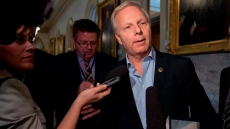WASHINGTON — When Israel's prime minister visits Washington soon, he'll find the White House doors slammed firmly shut.
Ditto those at the State Department.
A diplomatic tiff has exposed the depth of the frostbitten Benjamin Netanyahu-Barack Obama relationship, a contrast with the balmy ties with Canada toasted this week in Israeli newspapers.
The American administration has announced the president won't meet with Benjamin Netanyahu during his visit in early March, nor will U.S. Secretary of State John Kerry.
The stated rationale is that it would be inappropriate to meet during the Israeli election. Polls suggest the centre-right Likud party of Prime Minister Benjamin Netanyahu faces a tough fight in the March 17 vote.
His trip to Washington dovetails with the nationalism-and-national-security messages of his re-election campaign. He'll speak to the U.S. Congress about the dangers of a potential nuclear-armed Iran and during that early-March trip will also attend a conference of America's biggest pro-Israel lobby group.
The planning details of the visit hint at mutual distrust between the governments. The White House says it wasn't informed of Netanyahu's plan to be in the capital, at the invitation of congressional Republicans. It calls that a breach of protocol for a visiting leader.
Now the president's announcing he won't meet Netanyahu.
''The president, obviously, does not see heads of state or candidates (during campaigns),'' State Department spokeswoman Jen Psaki said Thursday.
''Neither will the secretary of state in close proximity to their election, so as to avoid the appearance of influencing a democratic election in a foreign country.''
Asked whether the visit was an attempt to pump up the political prospects for Netanyahu, who has fallen slightly behind and now trails a centre-left coalition in the polls, Psaki replied: ''I'm just not going to do political analysis on the Israeli election from here.''
A spokesman for Obama explained that the president had met multiple times with Netanyahu and would meet again with whoever wins the Israeli election.
A piece in the Atlantic magazine a few months ago predicted a coming crisis in Israeli-U.S. relations, with the flashpoint being Netanyahu's staunch opposition to a nuclear deal with Iran.
Negotiations are now at a critical stage. But Netanyahu will deliver a speech in Congress advocating a new economic sanctions bill against Iran, favoured overwhelmingly by Republicans and by many Democrats.
The plan runs against the wishes of the president. Obama has threatened to veto any sanctions legislation now because he says that could derail talks with Iran at a sensitive moment.
Adding to the drama is a suspiciously timed leak, involving highly classified information. A U.S. news outlet this week reported that the Israeli intelligence agency, Mossad, also opposes new sanctions and disagrees with Netanyahu.
This is after U.S. officials were quoted in the Atlantic making disparaging remarks about Netanyahu a few months ago — accusing him of political cowardice in the Middle East process.
Canadian relations with Netanyahu are another story.
Asked whether it would meet with the Israeli prime minister during the election, a government spokesman replied with an email showing pictures of Foreign Affairs Minister John Baird in Israel this week.
They showed Baird meeting with Netanyahu, and with politicians from rival parties. They included Shimon Peres, the former prime minister and president under the Labor and Kadima banners.
A column this week in the Jerusalem Post called Baird ''arguably the most pro-Israel foreign minister in the world.'' While he was showered with praise there, some Palestinian protesters pelted eggs at his car during Baird's Mideast trip.
A Middle East expert at the University of Ottawa said the fundamentals of the U.S.-Israel relationship remain strong, too.
Thomas Juneau pointed to the US$3 billion in American aid and military support as examples of the unshaken foundation beneath the rocky personal relations at the top.
''It's not necessarily because the two leaders evidently dislike each other on a personal level that the relationship between the countries changes a lot,'' Juneau said.
''We are nowhere near anything that resembles an existential crisis in U.S.-Israeli relations.''
But he said Netanyahu's early-March visit could reap political dividends back home, particularly the sight of him speaking from the podium in the U.S. Congress: ''I can only imagine that (his domestic political) rivals are not happy about that.''





